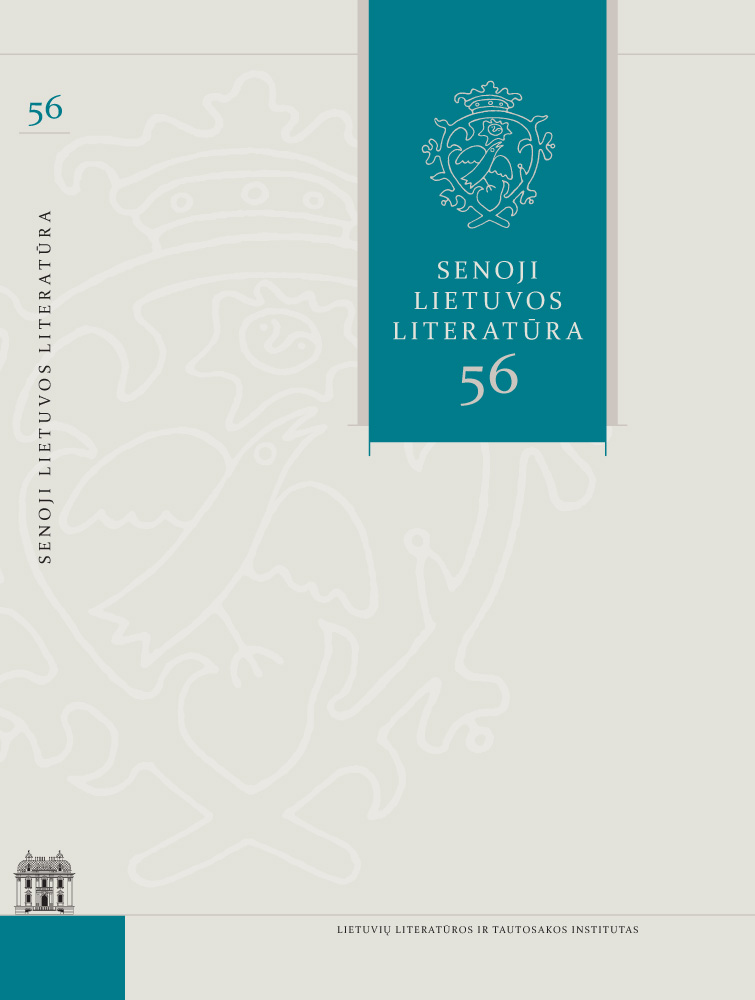The Attitude towards Public Magistrates and their Principles of Practice in the Political Texts of the Jesuits of Vilnius in the Seventeenth Century
Abstract
In the Grand Duchy of Lithuania, it was a common practise among the Jesuits to depict, in their literary texts, an idealised image of the ruling elite who held the main positions of public magistrates. However, from the seventeenth century, it can be traced that the consideration on the attributes and reason of practise of public magistrates found its way to academic discourse. The Jesuits, who had the major authority in the scholarly field in the Grand Duchy of Lithuania, introduced the reflection on public magistrates rooted in the tradition of the scholastic scholarship and philosophy.
The discourse on public magistrates was already undertaken by the Jesuits of Western Europe, who produced the series of books ‘Politics’, which contained the knowledge of state governance. The best-known authors of this kind of books are Spaniards Juan de Mariana and Pedro de Ribadeneira, Flemish Carlo Scribani, and German Adam Contzen. They were facing the task of describing public magistrates. However, their approach to it was not unanimous: both the nature of the public magistrates described by these authors and the attitude towards the kind of knowledge they should provide on the topic differed. Although it seems that they all shared, to a greater or lesser extent, the same strategy in composing their texts, i.e., listing practical information necessary to one magistrate or another to perform their functions and duties, it is obvious that they had to choose between enumerating the qualities of magistrates’ character or the principles of their practice, or whether to ascribe these precepts from the perspective of the ruler or the magistrate. These differences can show the attitude of the Jesuits to whether public magistrates were considered as autonomous institutions regarding their duties or as ones subjected to a higher authority.
In the Grand Duchy of Lithuania, the Jesuits did not compose such treatises, except for Aaron Alexander Olizarovius. Nonetheless, ‘Politics’ found its way to the Lithuanian political discourse. It was promoted by the Jesuit professors at Vilnius University during the lectures on politics (Andrzej Boreysza, Zachariasz Modzelewski, and Krzysztof Puciłowski) and by composing philosophical theses (Lukasz Zaluski, Modzelewski). In contrast to their Western colleagues, the Jesuits of Vilnius put more emphasis on the duties and attributes of a good citizen rather than on a good magistrate; nevertheless, they also reflected on the former, although in a less elaborate way. They distinguished such public magistrates as senators or king’s advisers, judges, courtiers, and Church magistrates. The structure and content of these descriptions of officials seem to share many similarities with Western European Jesuit texts.

This work is licensed under a Creative Commons Attribution 4.0 International License.
Most read articles by the same author(s)
- Matas Grubliauskas, The Approach of Christophorus Puciłowski SJ (1650–1707) to the Principle of fides in the Field of Politics , Senoji Lietuvos literatūra: Vol. 52 (2021): Senoji Lietuvos literatūra
